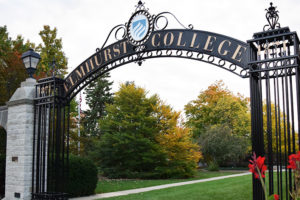
On August 21, Elmhurst College treated incoming first-year students to their first lunch on the College Mall.
The meal had all the trappings of a typical picnic, from the big white tent to the menu of barbecue, veggie burgers and baked beans.
Unlike most picnics, however, Elmhurst’s welcome lunch didn’t create any waste. From the dishes and cups to the silverware and food scraps, everything at the event was compostable.
At the edge of every buffet table sat two garbage cans—one labeled Compost, the other labeled Landfill (to accommodate trash from other sources). Each pair was guarded by a member of the Living Green Team, a group of students who work in the cafeteria teaching about recycling and composting.
Biology major Jennise Fermosa ’14 stood by one pair of trashcans, cheerfully telling people where to toss their empty plates and cups. A two-year member of the Living Green Team, she often performs a similar task in during the school year, standing by the garbage cans in the cafeteria to coach people in greener practices.
“I think it’s important to educate people,” she said, pausing to transfer a misplaced napkin from one bin to the other. “The majority of campus is moving in today, so they get to learn about sustainability.”
The No-Waste Lunch was the brainchild of education major Jacob Henry ’16. “We’re a very green campus—but this lunch wasn’t,” he explained. “We wanted to fix that.”
After researching waste-free picnics at other institutions, Henry presented his findings to the Sustainability Committee, a group of students, faculty, and staff committed to making Elmhurst College a greener campus. The Committee agreed to pursue the idea, and formed a partnership with Chartwells, the College’s food service provider, to make it happen.
“We have great teamwork. Chartwells and the College were very supportive, and it really took the whole institution to pull this off,” Henry said.
Travis Orman, director of dining services and an active member of the Sustainability Committee, also stressed the importance of teamwork in turning a proposal into a reality: “It’s partnership, it’s commitment, it’s doing the right thing,” he said.
In his three years at Elmhurst College, Orman has dedicated himself to making sustainability a daily campus effort. The cafeteria already uses compostable plates, cellulose-based silverware, and cups made of cornstarch. Still, he thinks events like this are important because they raise awareness of greener living habits.
“To be actually doing an orientation lunch without any Styrofoam, bottles or cans isn’t a first just for Chartwells, but for the College itself,” he said. “I believe zero waste takes commitment. I believe it’s achievable.”
Sustainability efforts at the College continue to grow. This year, the Office of Residence Life is focusing on reducing waste during residence hall openings and closings. Campus buildings are installing more filling stations for water bottles, and the cafeteria recently received a grant for a food grinder to further minimize waste.
In the end, the No-Waste Lunch served as the kick-off to sustainability efforts that last all year, every year. “With the right attitude and the right focus, we have the ability to really change the world,” said Orman. “And that feels good.”